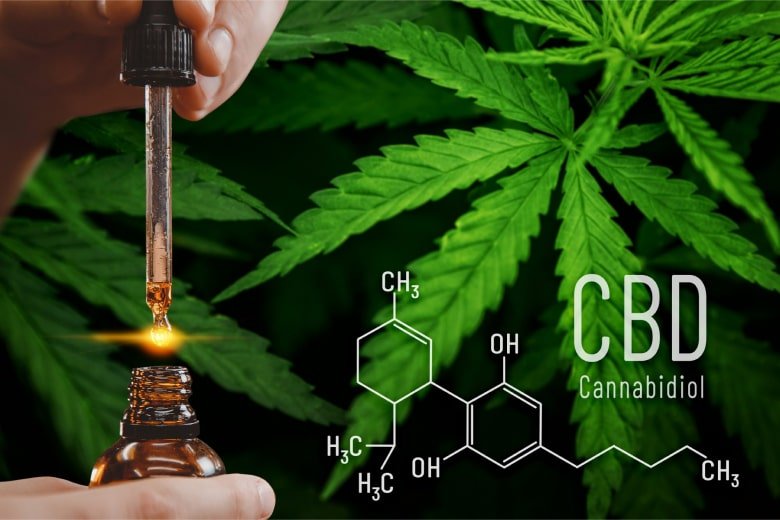What is CBD?
You may have heard CBD referred to as “cannabis without THC.” The truth is that CBD (otherwise known as “Cannabidiol”) is simply one active component of cannabis.
Cannabis as a whole contains many different ingredients; Cannabidiol is one of them. CBD’s growth in popularity is a result of its ability to alleviate an array of symptoms without the psychoactive effects that THC (tetrahydrocannabinol) provides.
THC is the ingredient that is still illegal in several countries and in many US states. CBD, on the other hand, simply acts as natural medicine and has been touted to ease pain, soothe anxiety, prevent epileptic seizures, and more.
Because of this, CBD is more widely accepted and legalized than its sister strain, THC. However, that doesn’t mean it isn’t still closely monitored and regulated.
In addition, CBD, or cannabidiol, is a compound found in cannabis that has gained popularity for its potential health benefits. Although research is still in its early stages, some potential benefits of CBD include:
- Pain Relief: CBD is known for its analgesic properties. It may help manage chronic pain by affecting endocannabinoid receptor activity, reducing inflammation, and interacting with neurotransmitters.
- Anti-Inflammatory Effects: CBD has anti-inflammatory properties that may benefit conditions like arthritis, where inflammation is a major component.
- Anxiety and Depression: Some studies suggest that CBD can help reduce anxiety and depression in both human and animal models, likely due to its ability to act on the brain’s receptors for serotonin, a neurotransmitter that regulates mood and social behavior.
- Sleep Disorders: CBD has been reported to improve sleep in individuals with insomnia and other sleep disorders by addressing underlying causes such as anxiety or pain.
- Epilepsy and Seizures: One of the most well-documented benefits of CBD is its effectiveness in treating certain types of epilepsy. The FDA has approved a CBD-based medication called Epidiolex for treating seizures associated with Lennox-Gastaut syndrome and Dravet syndrome.
- Neuroprotective Properties: Research suggests that CBD may provide benefits for neurological disorders such as multiple sclerosis and Parkinson’s disease by reducing neuroinflammation and oxidative stress.
- Heart Health: Some studies indicate that CBD may benefit heart health by lowering high blood pressure and reducing the risk of heart disease. This could be due to its stress-reducing and antioxidant properties.
- Skin Conditions: CBD’s anti-inflammatory properties may help treat conditions like acne and psoriasis. Some topical CBD products are marketed for their potential to reduce skin inflammation and sebum production.
- Substance Abuse Treatment: Preliminary research suggests that CBD may help treat addiction by modifying circuits in the brain related to drug addiction and reducing drug-seeking behavior.
- Antipsychotic Effects: CBD may help manage symptoms of schizophrenia and other mental health conditions by reducing psychotic symptoms.\
“It’s important to note that while these potential benefits are promising, more research is needed to fully understand CBD’s efficacy and safety. The FDA does not currently regulate the purity or safety of CBD products, so consumers should use caution and consult with a healthcare professional before using CBD, especially if they have underlying health conditions or are taking other medications.”
Can CBD interact with medications?
Yes, CBD can interact with various medications.
Individual Variability: The degree of interaction can vary based on individual factors, including genetic differences in enzyme activity, age, liver function, and overall health.
Consulting Healthcare Providers: Due to the potential for interactions, it is crucial to consult with a healthcare provider before using CBD, especially if you are taking other medications. A healthcare provider can help assess the risk of interactions and adjust medication dosages if necessary.
Given these potential interactions, it is essential to approach CBD use with caution and under medical supervision, particularly if you are on prescription medications.
Types of CBD
Companies that manufacture CBD products use various methods to extract the compound from the cannabis plant, leading to different types of CBD:
- Full-Spectrum CBD:
- Contains all cannabinoids found in the cannabis plant, including trace amounts of THC (less than 0.3%).
- Also includes other beneficial compounds like terpenes and flavonoids, which may work synergistically with cannabinoids in what is known as the “entourage effect.”
- Broad-Spectrum CBD:
- Contains multiple cannabinoids and other beneficial compounds, but THC is removed completely.
- Provides the potential benefits of the entourage effect without the presence of THC.
- CBD Isolate:
- Pure CBD with no other cannabinoids, terpenes, or flavonoids.
- Ideal for individuals who need to avoid THC entirely or who prefer to use CBD in its purest form.
Differences Between CBD and THC
Cannabidiol (CBD) and tetrahydrocannabinol (THC) are two of the most well-known cannabinoids found in the cannabis plant. While they share a similar chemical structure, they have different effects and uses. Here’s a detailed comparison:
Chemical Structure
- Psychoactive Effects:
- CBD: Non-psychoactive and does not produce a “high.” It is often used for its potential therapeutic benefits without altering mental state.
- THC: Psychoactive and produces the “high” commonly associated with marijuana use.
- Legal Status:
- CBD: Federally legal in the United States if it contains less than 0.3% THC. However, state laws vary, and some states have stricter regulations.
- THC: Illegal at the federal level in the United States, but legal for recreational or medicinal use in several states.
- Uses:
- CBD: Used for its potential to treat conditions such as epilepsy, anxiety, chronic pain, and insomnia.
- THC: Used for its potential to alleviate symptoms such as pain, nausea, and appetite loss, often in the context of cancer or AIDS treatment.
- Side Effects:
- CBD: Generally well-tolerated, with some potential side effects including dry mouth, diarrhea, reduced appetite, drowsiness, and fatigue.
- THC: Can cause side effects such as increased heart rate, coordination problems, dry mouth, red eyes, slower reaction times, and memory loss. It can also induce anxiety or paranoia in some people.
- Potential Interaction with Other Medications
- CBD: Can interact with certain medications, including blood thinners, leading to either increased or decreased effects of the medication. With the metabolism it can metabolized by the liver, can affect how other drugs are processed.
- THC: Can interact with medications that affect the central nervous system, such as sedatives and antidepressants.
- Usage Methods
- CBD: Forms: Oils, tinctures, edibles, capsules, creams, and vaping products. Administration: Oral, sublingual, topical, and inhalation.
- THC: Forms: Dried flower, edibles, tinctures, oils, concentrates, and vape cartridges. Administration: Smoking, vaping, oral ingestion, and topical application.
Both CBD and THC have valuable therapeutic properties, but they differ significantly in their effects and uses. Understanding these differences can help individuals make informed decisions about which cannabinoid is best suited for their needs, whether for medical purposes or recreational use. Always Consulting Healthcare Providers, a healthcare provider can help assess the risk of interactions and adjust medication dosages if necessary.
Cannabinoids and Drug Testing
Cannabinoids like THC and CBD are stored in the body’s fat. They can show up on drug tests for several days or weeks after you use them.
Not every drug test can detect CBD, but CBD-sensitive tests are available. Most standard drug tests look for chemicals related to THC, so THC or cannabis use might appear on a screening.
Products that claim to be THC-free may not actually be free of THC, so if you’re getting a drug test, avoid any CBD or THC products.
Storage in the Body
- Fat Solubility: Cannabinoids like THC and CBD are lipophilic, meaning they are stored in the body’s fat tissues. Because of this, they can remain in the body for extended periods and may show up on drug tests days or even weeks after use.
Detection in Drug Tests
- THC Detection: Most standard drug tests are designed to detect THC or its metabolites. Common tests include urine, blood, saliva, and hair tests, with urine tests being the most common. THC can be detected for varying periods depending on the frequency of use.
- CBD Detection: CBD is not typically targeted in standard drug tests. However, specialized tests can detect CBD if necessary. The presence of CBD alone is unlikely to result in a positive drug test for cannabis.
Cross-Contamination and Mislabeling
- Hemp and THC: Hemp plants, which are legally defined as cannabis plants containing less than 0.3% THC, can still produce small amounts of THC. Consequently, using hemp-derived CBD products can potentially result in a positive test for THC, especially if the product contains more THC than advertised.
- Product Purity: Products labeled as THC-free may still contain trace amounts of THC due to cross-contamination during manufacturing or inaccurate labeling. This can pose a risk for individuals who undergo regular drug testing.
Avoiding Positive Drug Tests
To minimize the risk of a positive drug test:
- Choose Products Wisely:
- Look for CBD products that are third-party tested and have a Certificate of Analysis (COA) showing no detectable THC.
- Avoid products that do not provide transparent testing results.
- Understand Product Labels:
- Be aware that terms like “broad-spectrum” or “isolate” often indicate no detectable THC, but always verify with a COA.
- “Full-spectrum” products contain all cannabinoids found in the plant, including trace amounts of THC.
- Consult with Employers:
- If using CBD for medical reasons, consider discussing this with your employer or the entity conducting the drug test. Some organizations may make accommodations if informed ahead of time.
- Be Cautious with Dosage:
- Even with low-THC products, high dosages could potentially lead to accumulation of THC in the body over time.
By following these guidelines, individuals can better navigate the complexities of cannabinoid use and drug testing, ensuring they remain compliant with testing policies while still benefiting from the potential therapeutic effects of CBD and other cannabinoids.

